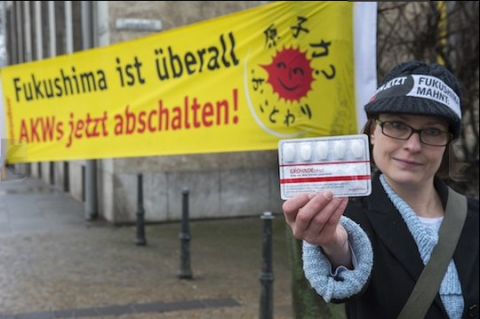"Fukushima is everywhere, switch off nuclear power stations now," says the banner.
Germans demonstrated against nuclear industry in more than 190 locations across their country to mark the second anniversary of the Fukushima catastrophe in Japan on the 11th of March.
Already on Saturday, in mainly foul weather, more than 28.000 turned up at nuclear power stations at Grohnde, Günzburg and Neckarwestheim and a uranium enrichment plant at Gronau.
Demonstrators argued that a lot more lessons need to b e learned from Fukushima than have been so far.
More haste should be made to shut down Germany’s nuclear industry and shutting down its nine remaining nuclear power stations earlier than the planned year of 2022. Eight were shut down after Fukushima which Chancellor Angela Merkel called a “wake-up call”. At the change of the century there were still 19.
Germany is the only industrial country to declare that it is giving up nuclear power. The issue will play largely in an election due this year. Past opinion polls have found large majorities of Germans opposing nuclear power. More protest actions are planned for the coming months.
A video (in German) of the protest at Grohnde is available at http://www.ausgestrahlt.de/mitmachen/fukushima2013/video. Other pictures, press coverage are at http://www.ausgestrahlt.de/mitmachen/fukushima2013, https://linksunten.indymedia.org/de/node/80643 and http://www.publixviewing.de/index.php?cont=news&id=231&n=1.
Friends of the Earth Germany (BUND) has just published a study showing security flaws at all nine remaining nuclear power stations and calls on all political parties to campaign for ending nuclear industry (www.bit.ly/BUND-Studie, in German, includes pictures of the stations).
"The nine atomic power stations still operating in Germany pose enormous risks," BUND writes. Those in Grafenrheinfeld, Gundremmingen B and C, Philippsburg 2, Grohnde, Emsland and Isar 2 are not adequately protected against possible earthquakes, those in Grafenrheinfeld, Gundremmingen B and C, Philippsburg 2, Grohnde, Brokdorf and Neckarwestheim 2 not adequately against flooding. Added to that are risks from possible fires, disruptions in security systems due to age fatigue or lacking security cultures.
"Emergency power systems failed in the Forsmark plant in Sweden,almost causing a worst assumable disaster. The same can happen in German plants, for example in Gundremmingen. We can prove in detail that none of the German nuclear power stations still on the ghrid is safe. Obviously the priority of the operators is profit and not protection of the population from nuclear catastrophes," comments BUND chairman, Hubert Weiger.
It costs a power company up to one million euros for every day a switched off nuke does not produce power. This is why the Eon, RWE and EnBW utilities keep their plants on the grid as long as possible.
"The energy turnaround must not be talked down for election tactical reasons. Especially Chancellor Angela Merkel must make the successful continuation of the changing of the energy supply a main theme of her election campaign," BUND writes.

